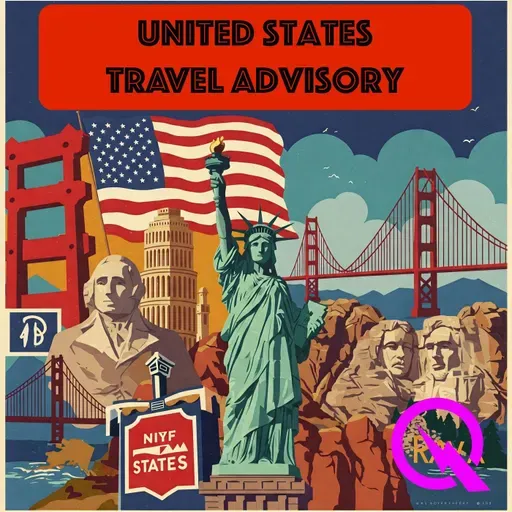
21 September 2025
US Travel Advisories 2025: Essential Safety Guide for International Travelers Navigating Global Risks and Destination Challenges
United States Travel Advisory
About
Listeners considering travel to or within the United States should be aware that the U.S. Department of State issues ongoing travel advisories not only for Americans traveling abroad but also for international visitors, reflecting current global trends in safety, health, and security. According to TravelandTourWorld’s report for September 2025, the Department updates advisories monthly and ranks countries in four levels: Level 1 means to exercise normal precautions; Level 2 urges increased caution; Level 3 advises reconsidering travel; and Level 4 recommends not traveling due to significant risks. September’s advisories highlight a rise in global volatility, underscoring the need for heightened vigilance for all international travelers.
Some destinations have risen in risk level due to factors like crime, civil unrest, terrorism, health emergencies, and natural disasters. Popular tourist spots such as Haiti, Afghanistan, and Ukraine currently carry a Level 4 advisory; travelers are urged to avoid these locations entirely due to ongoing violence and instability. Countries like Thailand, Cambodia, and Italy, while still welcoming visitors, have Level 2 advisories because of increased caution regarding safety concerns, notably terrorism and criminal activity. The Department of State stresses that even in countries considered generally safe, travelers should maintain awareness of local conditions, political developments, and any emerging health situations.
Listeners headed for the U.S. should also pay attention to practical travel precautions. The Smart Traveler Enrollment Program (STEP)—described by USA.gov—lets travelers register their trip, enabling embassies or consulates to contact them in case of emergency, natural disaster, or significant event. Enrolling in STEP is a recommended best practice before departure.
Recent news in September 2025 reports several regions, especially in the Caribbean and Central America, experiencing surges in violent crime, civil unrest, and kidnapping, prompting upgraded advisories. For example, Haiti is under a Level 4 directive: do not travel due to widespread unrest and limited emergency support. Countries like Bangladesh and Honduras are at Level 3 with strong recommendations to reconsider travel due to frequent crime and social instability. Meanwhile, regions such as the Middle East—specifically Iran, Iraq, and Israel—remain unpredictable, with advisories urging travelers to stay vigilant or avoid travel altogether in volatile zones.
Safety is not just about the destination; listeners are encouraged to secure comprehensive travel insurance to cover medical emergencies, evacuation, and disruptions. Continually monitoring real-time news and government advisories is crucial, as situations can escalate rapidly. TravelandTourWorld emphasizes that with smart planning and a readiness to adapt plans, travelers can still enjoy enriching experiences while safeguarding their well-being.
Those planning trips should routinely check the State Department’s official travel advisory portal to review the latest country-specific warnings. Stay flexible, exercise increased caution, prioritize personal safety, and avoid high-risk regions. In today’s fast-evolving global environment, preparation and awareness are the keys to both safe travel and peace of mind.
This content was created in partnership and with the help of Artificial Intelligence AI
Some destinations have risen in risk level due to factors like crime, civil unrest, terrorism, health emergencies, and natural disasters. Popular tourist spots such as Haiti, Afghanistan, and Ukraine currently carry a Level 4 advisory; travelers are urged to avoid these locations entirely due to ongoing violence and instability. Countries like Thailand, Cambodia, and Italy, while still welcoming visitors, have Level 2 advisories because of increased caution regarding safety concerns, notably terrorism and criminal activity. The Department of State stresses that even in countries considered generally safe, travelers should maintain awareness of local conditions, political developments, and any emerging health situations.
Listeners headed for the U.S. should also pay attention to practical travel precautions. The Smart Traveler Enrollment Program (STEP)—described by USA.gov—lets travelers register their trip, enabling embassies or consulates to contact them in case of emergency, natural disaster, or significant event. Enrolling in STEP is a recommended best practice before departure.
Recent news in September 2025 reports several regions, especially in the Caribbean and Central America, experiencing surges in violent crime, civil unrest, and kidnapping, prompting upgraded advisories. For example, Haiti is under a Level 4 directive: do not travel due to widespread unrest and limited emergency support. Countries like Bangladesh and Honduras are at Level 3 with strong recommendations to reconsider travel due to frequent crime and social instability. Meanwhile, regions such as the Middle East—specifically Iran, Iraq, and Israel—remain unpredictable, with advisories urging travelers to stay vigilant or avoid travel altogether in volatile zones.
Safety is not just about the destination; listeners are encouraged to secure comprehensive travel insurance to cover medical emergencies, evacuation, and disruptions. Continually monitoring real-time news and government advisories is crucial, as situations can escalate rapidly. TravelandTourWorld emphasizes that with smart planning and a readiness to adapt plans, travelers can still enjoy enriching experiences while safeguarding their well-being.
Those planning trips should routinely check the State Department’s official travel advisory portal to review the latest country-specific warnings. Stay flexible, exercise increased caution, prioritize personal safety, and avoid high-risk regions. In today’s fast-evolving global environment, preparation and awareness are the keys to both safe travel and peace of mind.
This content was created in partnership and with the help of Artificial Intelligence AI